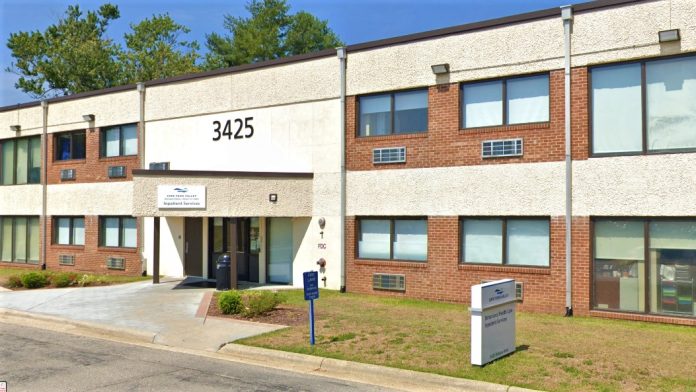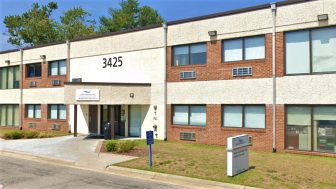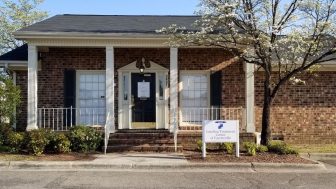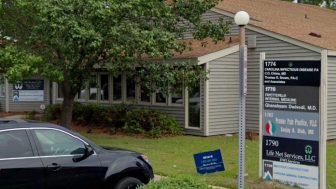Cape Fear Valley Behavioral Health Care
3425 Melrose Road
Fayetteville, NC 28304

About Cape Fear Valley Behavioral Health Care
Located in Fayetteville, North Carolina, Cape Fear Valley Behavioral Health is a Joint Commission accredited comprehensive mental health provider. Offering mental health assessments, emergency psychiatric care, medication assisted treatment, counseling, care coordination, inpatient residential treatment, dual diagnosis treatment, and intensive outpatient programs.
Focused on improving mental well being, staff at Cape Fear Valley Behavioral Health consist of psychiatrists, psychologists, clinical social workers, psychiatric nurses, licensed counselors, and other mental health professionals. Each program involves a comprehensive clinical assessment, individualized treatment planning, individual and group counseling, education, and nursing support. Using a range of evidence based therapies, patients may benefit from cognitive behavioral therapy, motivational interviewing, dialectical behavioral therapy, family counseling, trauma therapy, and medication assisted treatment (MAT). As a core component of the recovery program, residents will also participate in psychoeducation and skill building workshops that focus on relapse prevention, stress management, overcoming cravings, peer support, and developing a recovery community.
Cape Fear Valley Behavioral Health is accredited by the Joint Commission and licensed by the State of North Carolina. Medicaid, Medicare, military insurance (Tricare), commercial insurance, and self pay accepted.
Amenities
Private drug rehab provides a comfortable, secure environment that allows you to focus on doing the work to get your life back on track. Benefits include a higher staff-to-client ratio, increased one-on-one time with therapists and healthcare providers, private rooms for clients, and customized forms of therapy.
Residential drug rehab provides the comforts of home with the therapeutic support needed to successfully recover. Benefits of an inpatient program include increased safety, a higher success rate, and the time and distance given to focus on recovery. Residential drug rehabs are often the preferred method of treatment, as they can be tailored to meet specific needs, offer focused therapeutic care, and provide the necessary tools to sustain recovery.
In order to maintain a sense of autonomy, many private rehab facilities offer clients the ability to choose their own private rooms. The privacy and personal space ensure that the recovery process is as comfortable as possible.
Addiction Treatment Programs
When individuals participate in a young adult program in North Carolina, they feel more at ease in a setting that is age-appropriate. Activities, therapies, and aesthetics are all tailored for this age group, so participants can feel comfortable and are more likely to complete the program.
An adult program in North Carolina typically combines individual and group counseling, medical treatment, and various other therapies to treat substance use disorders. Treatment can take place in an inpatient or outpatient setting.
Men’s rehab in North Carolina offers customized treatment for men. These programs provide personalized treatment that is designed with the unique needs of men in mind.
Women’s rehab in North Carolina allows women to receive gender-specific treatment tailored to their needs. Programs are available for alcohol, heroin, prescription drugs, benzos, and any other addictive substances, as well as co-occurring disorders.
Many therapists use cognitive behavioral therapy in North Carolina to treat substance use disorders. This goal-oriented method addresses maladaptive thinking and related beliefs that affect behaviors and can lead to addiction.
Levels of Care
When you choose inpatient drug rehab in North Carolina, you’ll live at a rehab facility for 28 to 90 days, depending on the program. Typical methods of treatment include group and individual therapy and family counseling.
Outpatient rehab in North Carolina is often the next step for those who complete an inpatient program. This less restrictive treatment involves several hours of therapy per week, and accountability through 12-step meetings such as AA. You’ll continue this treatment as long as needed, which could be weeks, months, or years.
Aftercare rehab in North Carolina is a crucial part of relapse prevention. It gives you access to resources that will help you manage stress and overcome life hurdles. Typical services include career coaching, financial guidance, and ongoing counseling and emotional support. These may continue for a few months or more than a year after initial rehab.
Some of the most common co-occurring mental health disorders include anxiety, depression, and eating disorders. When these are present alongside substance use disorder, dual diagnosis treatment in North Carolina is necessary to address both conditions.
Accreditations
Accepted Insurance

Contact Information
Nearby Treatment Centers

4101 Raeford Road
Suite 100-B
Fayetteville, NC 28304

3425 Melrose Road
Fayetteville, NC 28304

3427 Melrose Road
Fayetteville, NC 28304

1014 Hay St
Fayetteville, NC 28304